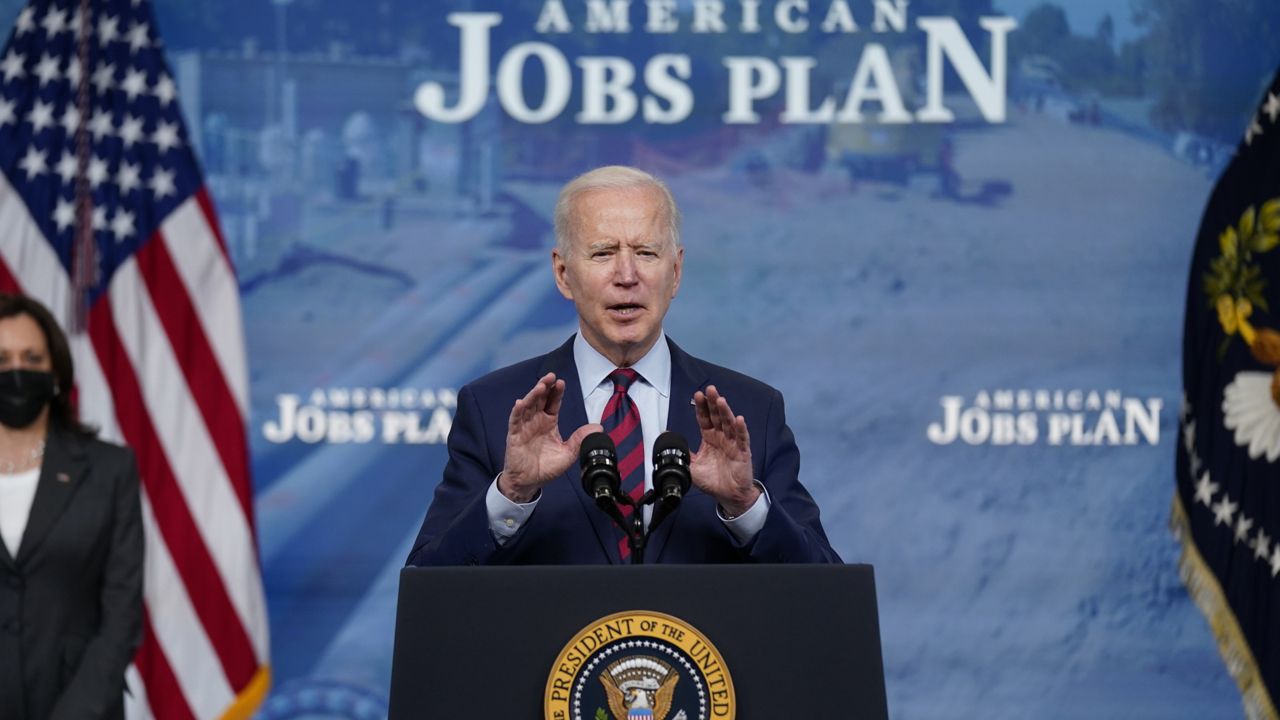President Joe Biden detailed his administration’s expanded view of infrastructure and the need to allocate massive amounts of money to upgrade the nation’s roads, bridges, water supply, clean energy solutions, and more in a speech from the White House on Wednesday.
In offering a full-throated defense of his proposed multi-trillion American Jobs Plan, Biden explained exactly which points his administration is — and is not — open to negotiating.
In defending the $2 trillion plan, the president said the country needs legislation to match the challenges of the 21st century. Roads, bridges, and trains are no longer the only necessary advancements; instead, the country needs to invest in high-speed internet, better technology, improvements for schools, updates to the caregiving industry, and much more, Biden said.
In the president’s view, infrastructure can and should include public policy that impacts any aspect of Americans’ ability to live, work, and raise families with dignity.
"The idea of infrastructure has always evolved to meet the aspirations of the American people and their needs,” Biden said. “And it is evolving again today."
The administration’s expanded view of what should be included in infrastructure spending has already met opposition from Republicans, who largely prefer a smaller, more targeted package that would fund the more traditional aspects of American infrastructure.
Biden said Wednesday he is open to changes in how to fund the plan, but did not back down in calling for a large proposal.
“Debate is welcome, compromise is inevitable, changes are certain,” the president said. “In the next few weeks, the vice president and I will be meeting with Republicans and Democrats to hear from everyone, and we will be listening, we will be open to ideas and good-faith negotiations.”
“But here's what we won't be open to: we won't be open to doing nothing,” he added. “Inaction is simply not an option.”
The president also touched on aspects of his Made in America Tax Plan, another major GOP sticking point that could delay passage of the legislation in Congress.
The current legislation proposes raising the rate to 28% and instituting a global minimum rate to dissuade companies from relocating in lower-tax havens. The hope is the returns from the tax hike will fund investments in roads, schools, broadband and clean energy, all approved by summer.
The White House says the American Jobs Plan could be fully paid for in 15 years if passed alongside Biden’s proposed corporate tax increase.
Biden acknowledged that he is open to hearing alternative funding suggestions, with one notable exception: “I will not impose any tax increases on people making less than $400,000 a year."
Hours ahead of Biden’s scheduled address, commerce secretary Gina Raimondo similarly indicated the administration is willing to negotiate on the corporate tax hike in an effort to speed the process along, which Biden later confirmed.
“There is room for compromise. That is clear,” she said of the corporate tax hike at Wednesday’s press briefing, adding that the administration hopes corporations will bring other offers to the table as opposed to walking away completely. Neither she nor press secretary Jen Psaki detailed how far the administration is willing to go, but implied the possible tax hike could be below the 28% proposal after ongoing negotiations with Democrats and Republicans in Congress.
Biden’s effort to pay for infrastructure will effectively undo former President Donald Trump’s tax break for corporations, a signature achievement of the Trump White House and its partners in Congress.
The 2017 GOP tax bill, which all the Republicans voted for, slashed the corporate rate from 35% to 21%. It was supposed to usher in a new era of American investment and job creation, yet growth never came close to the promised levels and the economy fell into a recession because of the pandemic.
“Where's the outrage there? I'm not trying to punish anybody, but dammit, maybe it's because I come from a middle class neighborhood, I'm sick and tired of ordinary people being fleeced,” Biden said of the Trump-era cuts.
Democratic senators led by Sen. Ron Wyden (D-OR), the chairman of the Senate Finance Committee, unveiled their own framework for an international taxation overhaul Monday that could provide an opening to Biden’s approach.
“We desperately need reform,” said Sen. Mark Warner (D-VA), one of those involved in the effort.
Shepherding Biden’s proposal through Congress remains a work in progress, particularly in the evenly-divided 50-50 Senate, where Democrats have the majority because the vice president from their party, Kamala Harris, can cast a tie-breaking vote.
But a single senator can break ranks to influence the size and shape of the package. On Monday, Sen. Joe Manchin (D-WV) indicated he would prefer a corporate tax rate at 25%, lower than what Biden is proposing.
Seizing on Democratic divisions, Republicans have signaled zero interest in undoing the tax cuts they approved with Trump, and instead prefer a smaller infrastructure package paid for by user fees on drivers or other public-private partnerships that share the costs.
Sen. Roy Blunt (R-MO), a member of Senate GOP leadership, said Sunday a smaller infrastructure package of about $615 billion, or 30% of what Biden is proposing, could draw bipartisan support.
Sen. Chris Coons (D-DE), a Biden ally, told Punchbowl News earlier Wednesday that there is an "opportunity here for us to come together around a smaller package" which would be more targeted to "hard infrastructure" that could receive Republican votes.
"Several fairly seasoned senior Republicans have surprised me by saying they'd be willing to vote for something up to a trillion dollars, and they're willing to raise some taxes to pay for it," Coons said. "One of the challenges is which taxes."



